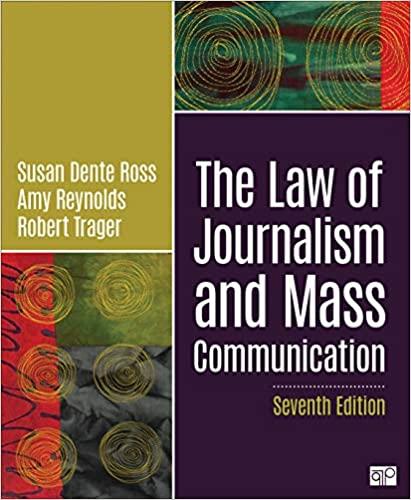Question
4th Amendment Search and Seizure Instructions: Read the below factual scenario. Answer the questions at the end of the scenario based on the application of
4th Amendment Search and Seizure
Instructions: Read the below factual scenario. Answer the questions at the end of the scenario based on the application of the 4th Amendment. Simply answering yes or no is insufficient, you must provide detailed reasons for your answer based on existing case law. You do not have to cite cases but must provide the legal basis for your answer.
Consider what legal justification is needed for a consent encounter, detention and arrest, and what kind of search, if any, may be conducted in each instance. A person is not arrested until an officer informs that person he or she is under arrest, the basis of the arrest, and the person submits to the arrest. Submit your answers in a PDF document.
Scenario: Officer Mendoza was patrolling one morning when he was approached by Joe, a homeless bum who lived in a make-shift shack under a highway overpass. Officer Mendoza had seen Joe wandering about the neighborhood on occasion. However, the officer had never talked to him before. Joe came up to him and the following conversation took place:
Joe: I saw a man steal some Dunkin donuts from an old lady.
Officer: Really? Where is he?
Joe: That's him over there sitting in that Mercedes."
Officer: Are you sure?
Joe: Yes I'm sure. I saw this elderly woman come out of the Donut Shop with a box of Dunkin donuts. She set the box down on a bench while she was using the pay phone, and this guy came along, while her back was turned and grabbed the box. I followed him for two blocks to his car. He's a thief.
Officer: Alright, I'll check it out, but you better not be lying to me, cause I know where you live.
Joe: I'll wait right here. You'll see I'm telling you the truth.
Officer Mendoza was in uniform and armed, but at all times kept his weapon strapped in his holster with the safety lock still on. He walked over to the Mercedes that Joe pointed out. He observed nothing unusual. A rather obese man dressed in a business suit was sitting in the driver's seat talking on his cell phone. The officer did not see a brief case or a Dunkin donut box or any donuts. Officer Mendoza tapped on the driver's side window and said in a polite tone of voice: "Would you mind stepping out of the car?" The man rolled down the window and the following exchange took place:
Driver: Excuse me? What did you say? Officer: Would you mind getting out of your car so I could talk with you?
Driver: Sure, OK.
When the man got out of his car Officer Mendoza noticed nothing unusual. However, it was his habit to always pat down anyone he talked to at close quarters. Without seeking the man's consent, or saying anything further, he patted down the man's outer clothing as he stood there. When he patted the outside of the man's front coat pocket he felt something soft and squishy. Having no idea what it might be, the officer reached in, putting his hand inside the pocket, and pulled out a half-eaten Dunkin donut. Officer Mendoza arrested the man and upon checking his identification discovered that the man was none other than Jellyroll Chubbyman, the notorious Dunkin donut thief.
After arrest:
Officer Mendoza asked Chubbyman why he stole the donuts?
Chubbyman said," I love Dunkin Donuts and just couldn't resist because Dunkin Donuts can't be found just anywhere. Besides, I needed to teach that lay a lesson for leaving such valuable goodies behind."
Assume Chubbyman is prosecuted for stealing the donuts and you are a legal intern working for the attorney that Chubbyman hired to defend him. The attorney, who has just started practice and does not have much experience in criminal cases, wants to exclude from evidence the half-eaten Dunkin donut found in the defendant's coat pocket. However, he is not sure whether a motion to suppress that evidence on Fourth Amendment grounds will be successful. Assume there is no other evidence in the case that can incriminate Chubbyman.
Assume that you have been given the police report and transcripts of interviews which contain all of the above information. The attorney has asked you to write a memo answering the following questions:
A. ) Did the officer violate the Fourth Amendment when he asked the defendant to get out of his car? In answering this question consider: a) Was there a seizure?b) Did the officer have reasonable suspicion that defendant might have stolen the donuts based on Joe's tip?
B. ) Did the officer's conduct which discovered the half-eaten donut constitute an unreasonable search and therefore violate the Fourth Amendment, why or why not?
C. ) Did the officer's questioning of Chubbyman after his arrest violate the Fifth Amendment, why or why not?
Tip: Read the questions carefully and answer only the question that is asked. In other words don't start writing about whether his arrest was proper, or whether he had a right to counsel, etc.
Step by Step Solution
There are 3 Steps involved in it
Step: 1

Get Instant Access to Expert-Tailored Solutions
See step-by-step solutions with expert insights and AI powered tools for academic success
Step: 2

Step: 3

Ace Your Homework with AI
Get the answers you need in no time with our AI-driven, step-by-step assistance
Get Started


